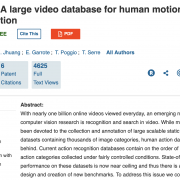October 11, 2022 - 4:00 pm
MIBR Reading Room 45-5165
Phillip Isola and Brian Cheung.
This is meant to be an informal discussion in which Phillip and Brian will give an overview of transformer networks and then we will open the floor for questions and discussion. It is likely that we will have another meeting at a later time discussing what transformers may contribute to...
September 25, 2022 - 9:45 am
Neuroscience PhD student Fernanda De La Torre uses complex algorithms to investigate philosophical questions about perception and reality.
Leah Campbell | School of Science
Although Fernanda De La Torre still has several years left in her graduate studies, she’s already dreaming big when it comes to what the future has in store for her.
“I dream of opening up a school one day where I could bring this world of understanding of cognition and...
September 19, 2022 - 4:45 pm
Dear General Vision Sciences & Engineering communities,
The goal of the Fourth Workshop on Shared Visual Representations in Human and Machine Intelligence (SVRHM) at NeurIPS 2022 is to discuss and disseminate relevant findings and parallels between the computational neuro/cognitive science and machine learning/artificial intelligence communities.
In the past few years, machine learning tools — especially deep neural networks — have...
September 13, 2022 - 4:00 pm
McGovern Reading Room (fallback Singleton Auditorium 46-3002)
Profs. Jim DiCarlo (Director, MIT Quest) and Tomaso Poggio (Director, CBMM)
Topic: New Home: CBMM is now part of the MIT Quest for Intelligence Initiative
We will have a combined CBMM | Quest research meeting to discuss CBMM’s recent move to the MIT Quest for Intelligence Initiative (MIT Quest.) A reception will be held immediately following the meeting. Hope you will be...
We will have a combined CBMM | Quest research meeting to discuss CBMM’s recent move to the MIT Quest for Intelligence Initiative (MIT Quest.) A reception will be held immediately following the meeting. Hope you will be...
August 30, 2022 - 2:15 pm
On its own, a new machine-learning model discovers linguistic rules that often match up with those created by human experts.
Adam Zewe | MIT News Office
Human languages are notoriously complex, and linguists have long thought it would be impossible to teach a machine how to analyze speech sounds and word structures in the way human investigators do.
But researchers at MIT, Cornell University, and McGill University have taken a step in this...
August 25, 2022 - 6:30 am
MIT scientists have discovered a population of neurons that light up whenever we see images of food.
Anne Trafton | MIT News Office
A gooey slice of pizza. A pile of crispy French fries. Ice cream dripping down a cone on a hot summer day. When you look at any of these foods, a specialized part of your visual cortex lights up, according to a new study from MIT neuroscientists.
This newly discovered population of food-responsive neurons is located...
August 12, 2022 - 12:45 pm
By Kim Hyun-bin
Hyundai Motor Group announced Friday the launch of the Boston Dynamics AI Institute with the goal of making fundamental advances in artificial intelligence (AI), robotics and intelligent machines. Hyundai and Boston Dynamics will make an initial investment of more than $400 million in the new institute, which will be led by Marc Raibert, founder of Boston Dynamics.
As a research-first organization, the institute will work on...
August 12, 2022 - 10:15 am
Tomaso Poggio and team were awarded the 2021 Helmholtz Prize for their paper HMDB: A large video database for human motion recognition (H. Kuehne; H. Jhuang; E. Garrote; T. Poggio; T. Serre). The paper has been cited over 1400 times with 6 patent citations.
The Helmholtz Prize is an award given biyearly by the TCPAMI at the International Conference on Computer Vision (ICCV) for fundamental contributions in Computer Vision. The award recognizes...
August 12, 2022 - 10:00 am
From Amnon Shashua's LinkedIn:
"Being entered into the Automotive Hall of Fame as this year’s mobility innovator is an incredible honor.
It is even a greater privilege to be someone outside of the mainstream of car design, development, or racing to receive this honor.
I am a computer scientist, an academic professor at heart, who 23 years ago realized that the car industry is the ideal platform for innovation and #AI at...
July 18, 2022 - 11:00 am
On July 11, 2022 at the nineteenth International Conference on Information Processing and Management of Uncertainty in knowledge-based systems (IPMU 2022) in Milan, Italy, Prof. Tomaso Poggio delivered the plenary lecture on "The Science and Engineering of Intelligence." At this time, Prof. Poggio was presented with the Kampe de Feriet award.
The Kampe de Feriet award is given on the occasion of each IPMU Conference.
Previous winners:
The first...
June 16, 2022 - 2:30 pm
A new computational model could explain differences in recognizing facial emotions.
Matthew Hutson | McGovern Institute for Brain Research
Many of us easily recognize emotions expressed in others’ faces. A smile may mean happiness, while a frown may indicate anger. Autistic people often have a more difficult time with this task. It’s unclear why. But new research, published June 15 in The Journal of Neuroscience, sheds light on the inner...
May 30, 2022 - 2:15 pm
Hate is a powerful negative emotion, but a word that is easy to say. For example, many of us profess to hate public figures, such as politicians. One has only to browse social media to find declarations of hate for those in the public eye. So, is hate a hard-wired emotion in people? Medical News Today looked at the science behind why people feel hate.
The Merriam-Webster dictionary defines hate as being one of the following:
intense hostility...
May 25, 2022 - 2:00 pm
Podcast description [translated to English from Italian by Google]: They are two pioneers of artificial intelligence. Both Europeans transplanted to the United States, they are global reference points in research on the mechanisms of vision, perception in general and deep learning. The Italian physicist Tomaso Poggio, director of the Center for Brains, Minds, and Machines at the Massachusetts Institute of Technology, and the French...
May 24, 2022 - 2:30 pm
Postbac Jessica Chomik-Morales hopes to inspire the next generation of Spanish-speaking scientists with her podcast, “Mi Ultima Neurona.”
Jennifer Michalowski | McGovern Institute for Brain Research
Jessica Chomik-Morales had a bicultural childhood. She was born in Boca Raton, Florida, where her parents had come seeking a better education for their daughter than she would have access to in Paraguay. But when she wasn’t in school, Chomik-Morales...
May 24, 2022 - 2:30 pm
Brown and three other scientists recognized for advancing statistical, theoretical analyses of neuroscience data.
David Orenstein | Picower Institute for Learning and Memory
The Gruber Foundation announced on May 17 that Emery N. Brown, the Edward Hood Taplin Professor of Medical Engineering and Computational Neuroscience at MIT, has won the 2022 Gruber Neuroscience Prize along with neurophysicists Laurence Abbott of Columbia University,...















